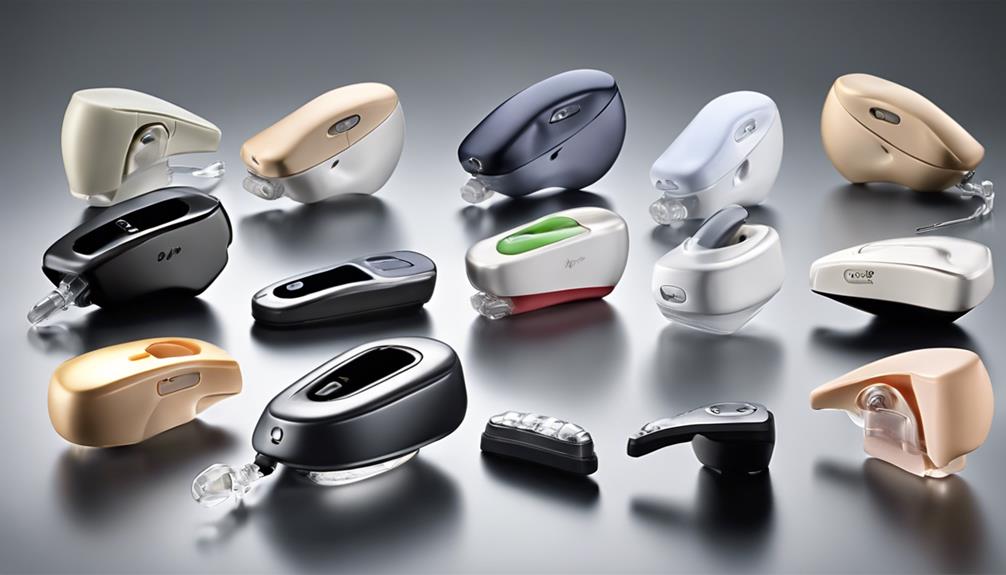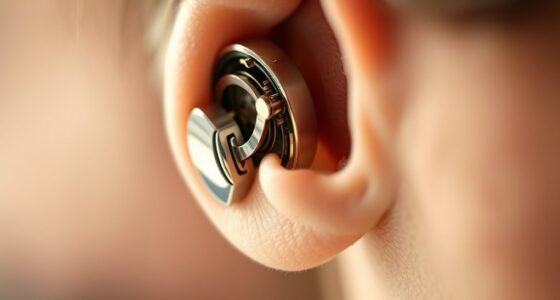Let’s delve into the intricate process of ensuring MRI scans are safe for individuals with cochlear implants, like navigating a ship through uncharted waters.
Understanding the nuances of MRI compatibility and precautionary measures is vital for the well-being of implant recipients.
But what are the specific guidelines that must be adhered to for a secure scanning process?
Join us in uncovering the essential steps to safeguarding the integrity of cochlear implants during MRI scans.
Key Takeaways
- Follow specific MRI guidelines for Cochlear implants
- Ensure MRI machine strength aligns with implant compatibility
- Consult healthcare providers and manufacturers for safety instructions
- Use arrow drawings to indicate implant magnet orientation
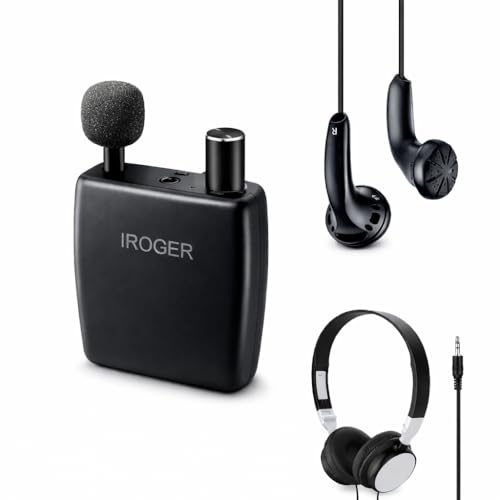
IROGER Hearing Amplifier for Seniors, Personal Sound Amplifier, Smart Auto-Gain, Directional Microphone, Rechargeable with 120-Hour Battery, Headphones & Earbuds Included
Smart Auto-Gain Control – Enjoy crystal-clear sound at all times. iRoger automatically balances audio levels to enhance voices...
As an affiliate, we earn on qualifying purchases.
Understanding MRI Compatibility With Cochlear Implants
When considering the compatibility of Cochlear implants with MRI scans, it's imperative to account for the presence of internal magnets within the implants. These magnets play a crucial role in the functionality of Cochlear implants, aiding in the transmission of sound signals to the auditory nerve. However, they can pose challenges during MRI scans due to the magnetic field's potential to interact with the implants.
For patients with Cochlear implants, specific radiology instructions must be followed to ensure MRI Safety. Certain Cochlear implant models, such as the Nucleus Profile Plus and Osia OSI200, are MRI Conditional at specific strengths, allowing for safe scanning under certain conditions. Additionally, different Cochlear systems like Baha Connect and Baha Attract have their own set of guidelines for MRI compatibility to minimize risks.
To guarantee safe MRI scans with Cochlear implants, it's essential to seek advice from your health care provider and strictly adhere to manufacturer recommendations. By following these precautions, patients can undergo MRI procedures with minimal risks and maintain optimal functionality of their Cochlear implants.

MoreDisp Digital Magnifier 5 Inch,Electronic Auto Focus Reading Aid Simplified Buttons Digital Video Magnifier for The Visually Impaired, Low Vision, Color Blindness, Amblyopia,26 Color Modes
【High Power Magnification】This 5.0 inch portable magnifier reading aids provide 2X-32X zoom magnification, the unit has been an...
As an affiliate, we earn on qualifying purchases.
Precautionary Measures for Safe MRI Scans
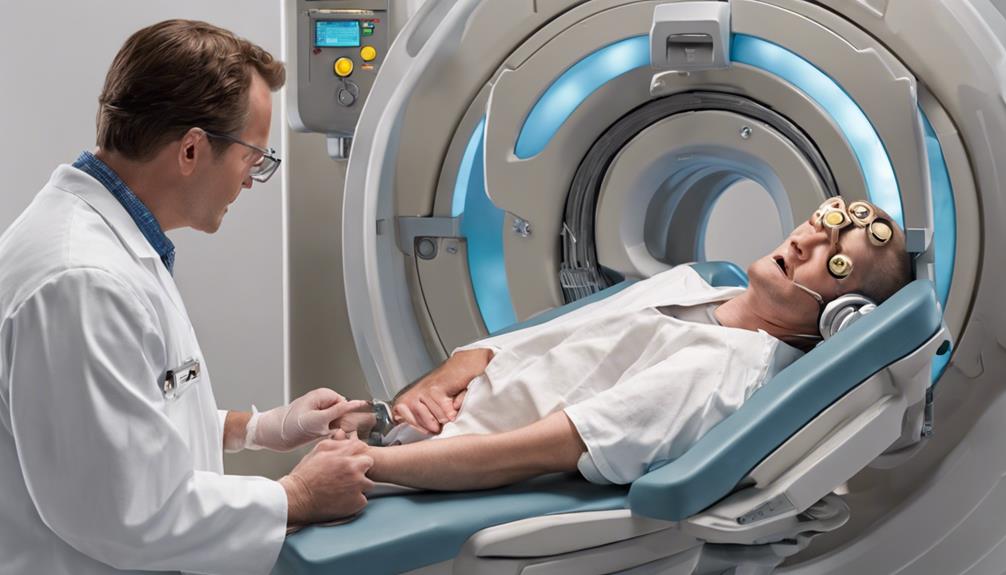
To ensure the safety of MRI scans for individuals with Cochlear implants, adherence to specific precautionary measures is crucial. When preparing for an MRI scan, healthcare providers must ensure that the MRI machine strength is compatible with the Cochlear implant by following the manufacturer guidelines.
Additionally, it's essential to use a compression bandage and protective splint during the MRI scan to prevent complications that may arise due to the magnetic field. Positioning the patient's head in a supine position without inclination is vital to maintain safety during the scan.
Consultation with experienced healthcare providers and the manufacturer for specific MRI safety instructions tailored to Cochlear implant recipients is recommended. Furthermore, utilizing arrow drawings to indicate the magnetic field orientation of the implant can help prevent issues during the MRI procedure.
Adhering to these precautionary measures is fundamental in ensuring the safety and well-being of individuals with Cochlear implants undergoing MRI scans.

Joanbro Personal Sound Amplifier for Seniors, Voice Enhancement Devices, Pocket Sound Amplifiers for Elderly People, Adults, 50dB Gain, with Headphones & Earbud, 3 Types Mics, 3 Tone, Volume Control
SUPERIOR PERSONAL SOUND AMPLIFIER: Applying noise cancelling, automatic gain control and advanced amplifying circuit, this sound amplifier device...
As an affiliate, we earn on qualifying purchases.
Guidelines for MRI Safety With Cochlear Implants
Guidelines for ensuring MRI safety with Cochlear implants encompass comprehensive protocols and standards endorsed by leading medical device manufacturers and radiology experts worldwide.
Cochlear implants like MED-EL SYNCHRONY are designed to be MRI-safe up to 3.0 Tesla without the need for magnet removal, ensuring hassle-free scans for recipients. MED-EL provides a lifelong guarantee for their cochlear implants, dating back to 1994 and applicable globally.
Radiologists can refer to the detailed medical procedures guide offered by MED-EL for in-depth information on ensuring MRI safety with cochlear implants.
Recipients with SYNCHRONY 2 implants can undergo 1.5 and 3.0 Tesla MRI scans with minimal discomfort, as supported by studies in the field.
In the rare event of damaged implants during MRI scans, MED-EL stands by their guarantee and promptly replaces the affected implants, offering recipients peace of mind and ensuring their protection.

Neosonic Rechargeable Hearing Amplifier to Aid TV Watching and Conversation, Wireless Neckband Headphones for Seniors & Adults, Remote Microphone Noise Cancelling - NW10 Pro
BACKGROUND NOISE REDUCTION - Equipped with a wireless external microphone, the NW10 Pro allows you to place the...
As an affiliate, we earn on qualifying purchases.
Ensuring Cochlear Implant Functionality During MRI
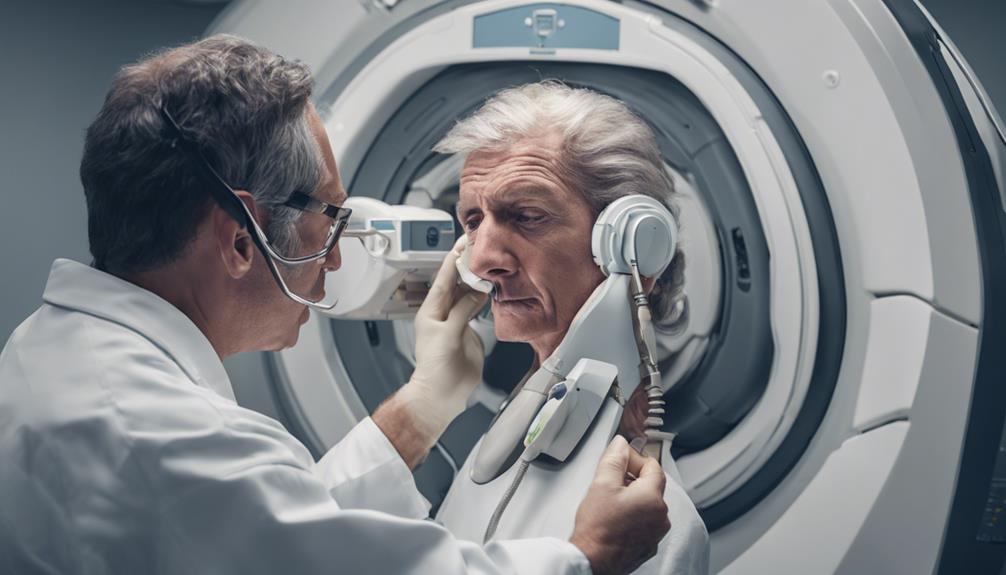
Transitioning from the guidelines for MRI safety with cochlear implants, ensuring optimal functionality during MRI scans requires precise alignment of the magnetic field with the implant to prevent complications.
It's essential to maintain an angle of less than 90° between the MRI magnetic field and the cochlear implant magnet to safeguard the implant's integrity. Positioning the patient's head in a supine position without inclination during the MRI scan is crucial for both safety and implant functionality.
Consulting the cochlear implant manufacturer for specific compatibility information and adhering to any special instructions provided is paramount for safe MRI scans. Using arrow drawings to indicate the orientation of the cochlear implant's magnetic field can assist radiologists and technicians in ensuring proper alignment during the scan.
Experienced physicians play a critical role in preventing iatrogenic complications and guaranteeing the safety and functionality of cochlear implants throughout MRI procedures.
Tips for a Successful MRI Scan With Cochlear Implants
When preparing for an MRI scan with a cochlear implant, ensuring the MRI facility is informed about the specific model of the implant is crucial for following the appropriate safety guidelines. Discussing the need for MRI scans with your healthcare provider is essential to understand any potential risks and necessary precautions related to your cochlear implant. Adhering to the manufacturer's instructions regarding MRI compatibility and safety precautions specific to your cochlear implant model is paramount. In some instances, the surgical removal of the internal magnet may be required before undergoing an MRI with certain cochlear implant systems. Prioritize your well-being by seeking professional guidance from experts experienced in conducting MRI scans for individuals with cochlear implants. Below is a table summarizing key tips for a successful MRI scan with cochlear implants:
| Tips for a Successful MRI Scan |
|---|
| Inform MRI facility about your cochlear implant model |
| Consult healthcare provider for potential risks and precautions |
| Follow manufacturer's instructions for MRI compatibility |
Frequently Asked Questions
When Did Cochlear Implants Become MRI Safe?
Cochlear implants became MRI safe with the introduction of the MED-EL SYNCHRONY implants. These implants allow hassle-free MRI scans up to 3.0 Tesla without the need for magnet removal.
The MRI safety guarantee for MED-EL cochlear implants has been in place since 1994 and is valid worldwide. Radiologists can access detailed information in MED-EL's medical procedures guide regarding MRI compatibility.
Studies have shown minimal discomfort during MRI scans with MED-EL SYNCHRONY cochlear implants.
Are Synchrony 2 Cochlear Implants Safe for Mri?
Yes, SYNCHRONY 2 cochlear implants are safe for MRI scans up to 3.0 Tesla without requiring magnet removal. These implants offer a hassle-free experience, eliminating the need for surgery or hearing downtime during the procedure.
MED-EL provides a lifelong MRI guarantee for SYNCHRONY 2 implants, ensuring patient safety and peace of mind. Radiologists can consult MED-EL's comprehensive guide for conducting MRI scans with these implants, emphasizing safety and patient comfort.
Are Titanium Cochlear Implants Safe for Mri?
Yes, titanium cochlear implants are safe for MRI scans, eliminating the need for magnet removal. These implants offer convenience and efficiency during imaging procedures, ensuring patient comfort and safety.
With advancements in technology, individuals can undergo MRI scans without compromising their hearing functionality or requiring additional surgeries.
The lifelong MRI guarantee provided by certain manufacturers further ensures protection and replacement of implants in case of any scan-related damage.
How to Do an MRI With Implants?
When doing an MRI with implants, ensure compatibility and safety by confirming implant specifications, following manufacturer guidelines, and consulting healthcare providers. Use specialized MRI kits for safe scanning with implants in place.
Inform the radiology team beforehand for proper settings. Follow protocols to ensure a successful MRI experience. Consult experts to guarantee a smooth procedure and minimize risks associated with implants during MRI scans.
Conclusion
In conclusion, adhering to manufacturer guidelines and consulting with healthcare professionals is paramount for ensuring safe MRI scans with cochlear implants.
By following precautionary measures and seeking expert advice, individuals can undergo MRI scans with confidence and peace of mind.
Remember, with proper care and attention, navigating MRI compatibility with cochlear implants is as easy as a walk in the park (or perhaps even easier)!


